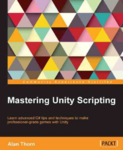Mastering Unity Scripting is a concise and dedicated exploration of some advanced, unconventional, and powerful ways to script games with C# in Unity. This makes the book very important right now because, although plenty of "beginner" literature and tutorials exist for Unity, comparatively little has been said of more advanced subjects in a dedicated and structured form.
The book assumes you're already familiar with the Unity basics, such as asset importing, level designing, light-mapping, and basic scripting in either C# or JavaScript. From the very beginning, it looks at practical case studies and examples of how scripting can be applied creatively to achieve more complex ends, which include subjects such as Debugging, Artiicial Intelligence, Customized Rendering, Editor Extending, Animation and Motion, and lots more. The central purpose is not to demonstrate abstract principles and tips at the level of theory, but to show how theory can be put into practice in real-world examples, helping you get the most from your programming knowledge to build solid games that don't just work but work optimally. To get the most out of this book, read each chapter in sequence, from start to inish, and when reading, use a general and abstract mindset. That is, see each chapter as being simply a particular example and demonstration of more general principles that persist across time and spaces; ones that you can remove from the speciic context in which I've used them and redeploy elsewhere to serve your needs. In short, see the knowledge here not just as related to the speciic examples and case studies I've chosen, but as being highly relevant for your own projects. So, let's get started.
The book assumes you're already familiar with the Unity basics, such as asset importing, level designing, light-mapping, and basic scripting in either C# or JavaScript. From the very beginning, it looks at practical case studies and examples of how scripting can be applied creatively to achieve more complex ends, which include subjects such as Debugging, Artiicial Intelligence, Customized Rendering, Editor Extending, Animation and Motion, and lots more. The central purpose is not to demonstrate abstract principles and tips at the level of theory, but to show how theory can be put into practice in real-world examples, helping you get the most from your programming knowledge to build solid games that don't just work but work optimally. To get the most out of this book, read each chapter in sequence, from start to inish, and when reading, use a general and abstract mindset. That is, see each chapter as being simply a particular example and demonstration of more general principles that persist across time and spaces; ones that you can remove from the speciic context in which I've used them and redeploy elsewhere to serve your needs. In short, see the knowledge here not just as related to the speciic examples and case studies I've chosen, but as being highly relevant for your own projects. So, let's get started.






